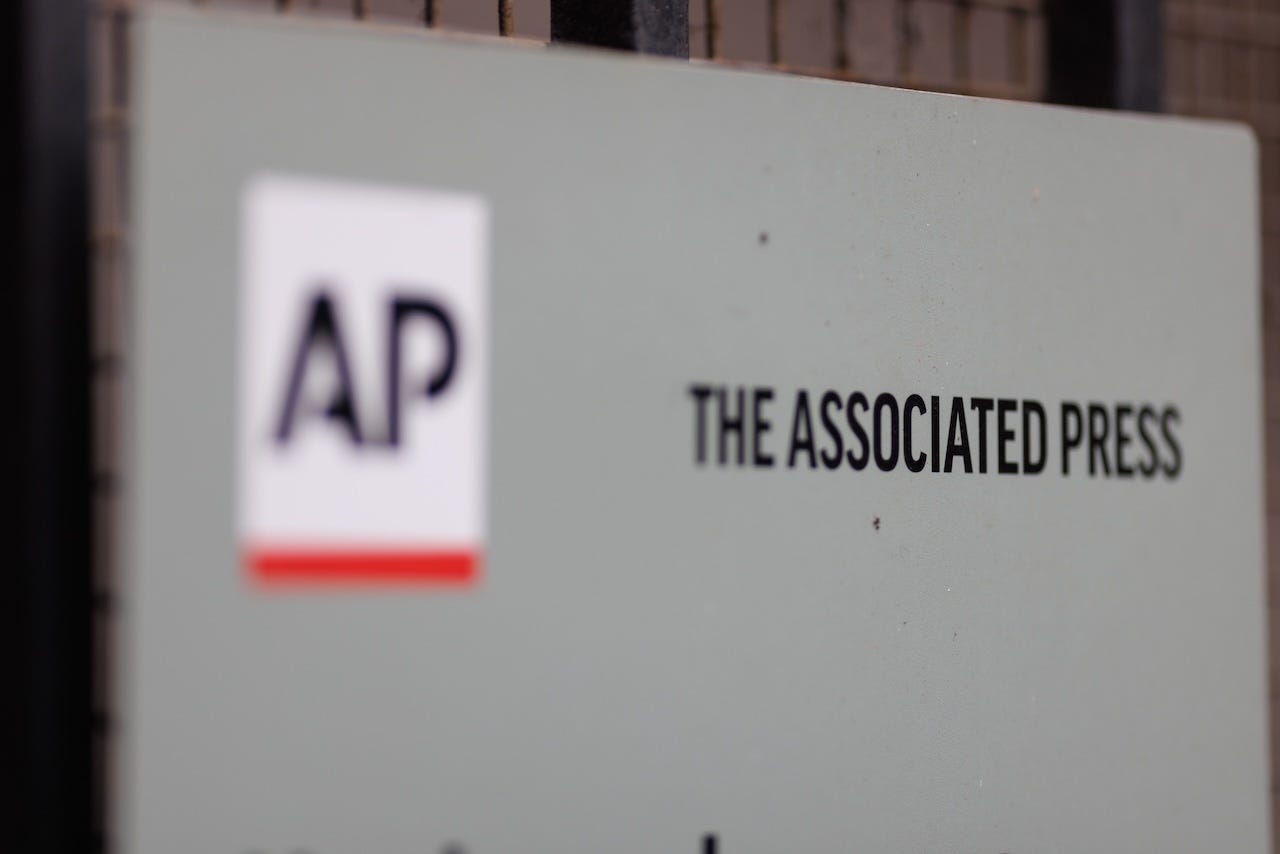Trump’s Exclusion of the Associated Press Will Not Stand
The Government Can’t Insist the Media Use “Gulf of America”
The White House is feeling its oats after a district court declined on Monday to order the administration to immediately reinstate the Associated Press into the White House Press Pool. The administration had kicked it out of the pool, where it has participated for over 100 years, based on the AP’s decision to employ the term “Gulf of Mexico” rather than Trump’s preferred “Gulf of America.”
In the wake of the decision, White House press secretary Karoline Leavitt announced a new policy that the White House itself would determine which news outlets can staff the pool, which has access to the most closely-quartered presidential settings such as the Oval Office and Air Force One. The change breaks with a practice of over 100 years in which the White House Correspondents’ Association determined the press pool membership. The ostensible justification was to permit “new media” outlets to have a greater role in the pool.
That was after White House spokesman Stephen Cheung ridiculed AP’s lawsuit as frivolous. Cheung said that the AP was “clearly suffering from a severe, debilitating case of Trump Derangement Syndrome that has rotted their peanut-sized brains.”
“We will defeat them in court just like we crushed their leftist reporters at the ballot box,” Cheung added.
Cheung would do well to tone down his brassiness, not only because it’s jerky, but also because it’s quite likely that he is going to have to eat his words.
The administration has drawn the wrong lesson from the decision entered by Trump-appointed Judge Trevor McFadden. McFadden merely declined to order the White House to reinstate the AP while he decides the overall claim, which he indicated has strong support in the controlling case law.
That’s an understatement. In fact, the White House’s punishment of the AP for not genuflecting at Trump’s name change was a raw violation of the most fundamental First Amendment principle—namely, that the government can’t tell newspapers or people what to think or say.
To quote the ringing words of Justice Robert Jackson in his 1943 opinion for the majority in West Virginia Board of Education v. Barnette, “[i]f there is any fixed star in our constitutional constellation, it is that no official, high or petty, can prescribe what shall be orthodox in politics, nationalism, religion, or other matters of opinion or force citizens to confess by word or act their faith therein.”
The administration’s characteristically overbearing tactics stepped directly on a third rail of First Amendment doctrine. The Supreme Court, as well as the D.C. Court of Appeals that stands above Judge McFadden, have spelled out the governing principle in categorical terms. With narrow exceptions not present here, it is unconstitutional to penalize news organizations based on the content of their publications.
So long as it’s a bona fide penalty, there’s no exception for McFadden’s notion of medium-sized punishment (not that I think denial of pool privileges would qualify under that standard). The government can’t discriminate based on media organizations’ content, period, full stop.
To frame it in lawyers’ terms, the White House would need a compelling interest to strip the AP of its press pool privileges; and disagreement with the AP’s decision to adhere to “Gulf of Mexico”—i.e., disagreement with the AP’s content decision—as a matter of law cannot be a compelling interest. Even though the AP didn’t secure an injunction, the White House is going to lose this case.
Worse for the administration, I also think it’s likely that the crass treatment of the AP has materially harmed the White House’s chances to get away with the new general policy that Leavitt announced on Monday. The policy would arrogate to the White House the choices for all the members of the press pool, who rotate among them to ensure overall national coverage. As reported by The New York Times, the new policy “would allow President Trump and his aides to handpick which reporters and media personalities were granted the ability to ask him questions and observe his behavior at specific events.”
In denying the requested relief, McFadden reasoned that the White House had not completely denied AP access to all press areas, just the preferred ones of the Oval Office and Air Force One.
That neutral-sounding justification might sound reasonable, but when it’s challenged in court, it will be against the backdrop of the AP shakedown. And it will fall to the White House to explain why the open-ended discretion won’t amount to content discrimination in practice. Looking at Trump’s track record with the AP, a court is likely to conclude that the policy is designed to reward outlets that curry favor with the president and parrot his views while penalizing those who don’t.
In other words, if you want to have access for your readers, you better play ball. That simply can’t fly—not without a revolution in First Amendment principles and doctrine.
And really, does anyone think there’s any other purpose behind the new policy apart from this most petty, vicious, Trumpian rationale?
Given the rock-solid First Amendment doctrine in play, McFadden’s refusal to order the White House to reinstate the AP’s access up front is hard to fathom. Stripping the Associated Press of its membership in the press pool imposed a real penalty—and one based on content—any way you look at it.
It’s a mistake by a judge best known for a series of marginal and arch-conservative rulings in hot-button cases.
But it’s a mistake that doesn’t really add up to much in the overall landscape in which patriots are battling Trump’s extravagant and unconstitutional power grabs.
That’s because first, as noted, McFadden hasn’t ruled—and I’d be very surprised if he did rule—that the administration can punish AP based on the content of its coverage.
Second, in the legal pushback against Trump, we are in the early stages of a long-range game. District court decisions can matter a lot, including because higher courts may have to defer to aspects of them, especially fact-finding. It’s also true that the general drumbeat of decisions against the administration can play a large role in public awareness of the authoritarian corruption of Trump 2.0.
But within the judiciary, it will be the higher courts whose decisions will be pivotal for the rule of law and the American experiment. That is at least unless and until other checks on executive power can come on board.
Overall, the country’s district courts have performed commendably, rising to the challenge of pushing back against Trump’s outlandish power grabs. With the Republicans in Congress browbeaten and indolent, and at least many in the legacy media cowed by Trump’s thuggish tactics, we have to look to the courts to hold the line.
And they have, by and large. In just the last few days, trial-level federal courts have blocked Trump’s federal funding freeze, immigration raids at certain houses of worship, withdrawal of support for certain DEI programs, and more.
Those heartening rulings have to stand up on appeal—including potentially to the U.S. Supreme Court—to effectively repulse Trump’s breathtaking self-aggrandizement.
That doesn’t mean that we can look to the district courts to always get it right. There will be judges who issue wacky rulings and others—far fewer, fortunately—who will issue tendentious pro-Trump decisions.
But at the end of the day, that’s why we have courts of appeals. And if those courts—including the Supreme Court—fail to come through and issue lawless rulings upholding Trump’s tyrannical moves, our best hopes were already misplaced.
Stay informed. Insist our representatives fight harder. Call out the lies.
Talk to you later.







I double dog dare them to allow the MeidasTouch bros and Substack writers in. 🐓🐓🐓🐓🐓🐓🐓
While this absurd and retaliatory 'schoolyard fight' (banning the AP from the Oval and AF1) from our toddler president continues, the AP will stand proud. I have always wondered how much the very staged "press conferences" really added to discussion, or revealed new truths. I think they've been contrived for years. I would not expect to hear objective truth from Karoline Leavitt any more than Sean Spicer from a previous administration, and so many more. We need the AP and I suspect they will prevail. As Mark Twain said in 1906, "There are only two forces that can carry light to all corners of the globe and only two -- the sun in the heavens and the Associated Press down here."